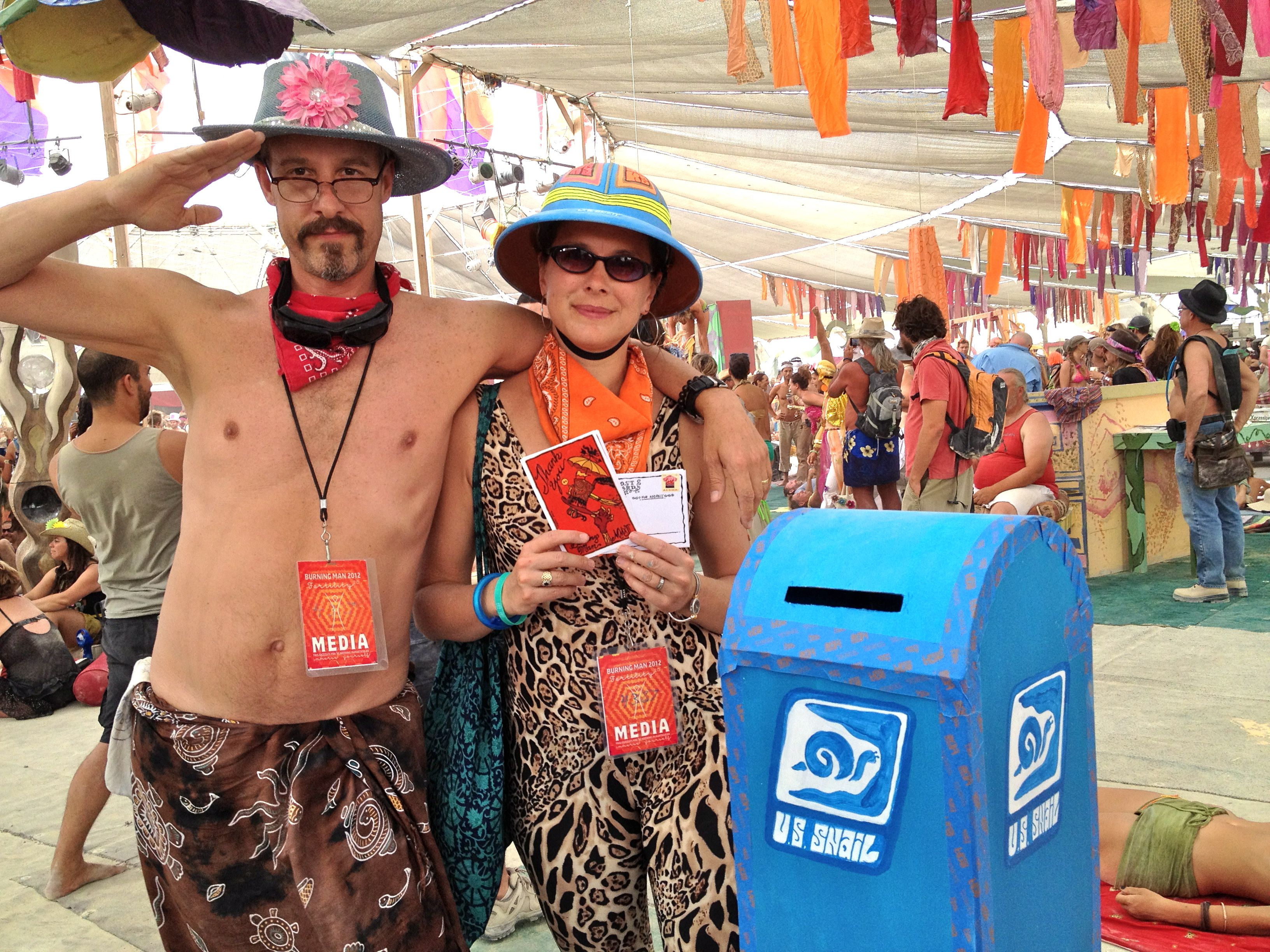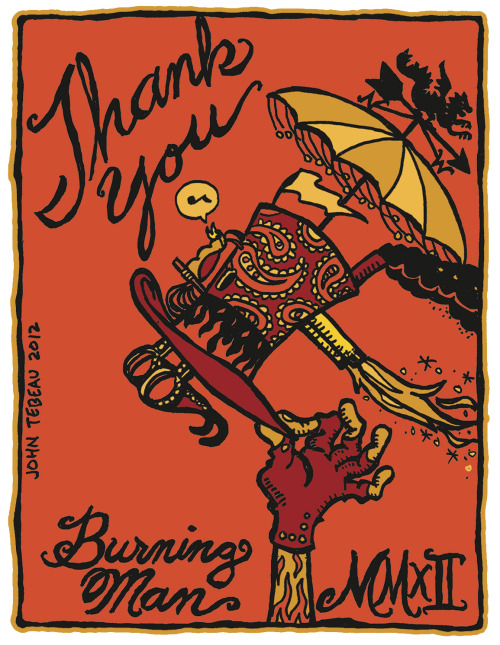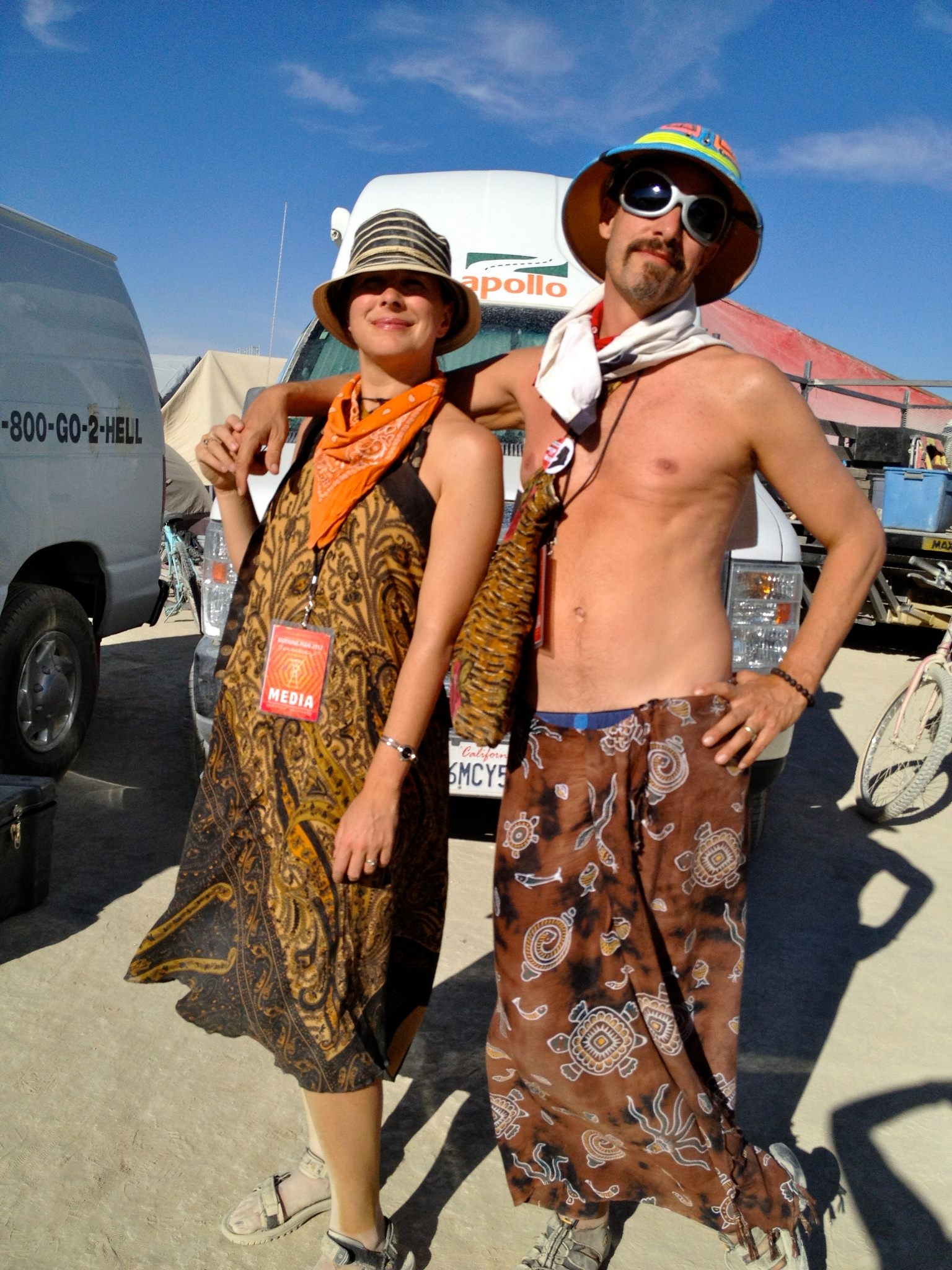
For the first two days we were at Burning Man, my recurring thought was that it seemed like a lot of money and effort to go have a party in the desert.
Then John and I shared a gift with strangers and my whole experience of the event changed. I began to see how profoundly beautiful the gift economy is.
Burning Man describes itself as an annual art event and temporary community based on radical expression and self-reliance. The cultural short hand seems to be stereotypes of hippies doing acid, wearing costumes and playing with fire in Nevada.
But I think the aspect that made the biggest impact on me was the generosity.
Commerce is prohibited, so you won’t find beer and food vendors, for example. Instead, gifting is encouraged. That takes place on a large scale, from elaborate art installations to dance clubs to spas to lectures, all set up free of charge, down to small scale, with people offering water, toilet paper and hugs to strangers.

One night, we had a wonderful dinner of grilled salmon and I just had more fish on my plate than I could finish. I offered my half-eaten dinner and dirty fork to someone I’d never met before, and he enthusiastically accepted.
Another day, John and I were riding bikes down a bumpy, dusty road when a stranger popped out in front of us with a plastic tub in his hands and asked if we’d like some homemade fudge. We interrupted our ride to eat fudge and chat for a bit.
When I’ve told these stories to people, the first reaction is often wondering if it’s safe. How do you know the fudge isn’t laced with something? How did the guy taking my salmon know if I had some terrible disease?
I think that response comes in part because we’ve learned that it’s weird to share with strangers. It’s one thing to share a bite of your dessert with a friend, but that’s too intimate with someone you don’t know. Some people have also had a hard time comprehending that these gifts in the desert aren’t trades but just no-strings-attached presents.
But at Burning Man, gifting is explicitly part of the culture, spelled out in 10 guiding principles, so people give all manner of gifts and people openly receive, whether they know the person doing the giving or not.
John went to Burning Man without me about a decade ago, joining up with friends who had an established camp at the annual gathering in a Nevada desert.
He came back with a qualified endorsement: I don’t know how much you’ll like it, but I think you should see it.

I could get behind that. As a journalist, I’m curious about plenty of things that I might not love. So after discussing it for years, we made plans to go. I booked a small RV, because if I don’t camp in the beautiful wilderness, I wasn’t especially interested in sleeping in a tent in a hot, dusty, noisy party zone. And I pitched a freelance story on Burning Man, helping offset our expenses while also giving me a reason to start talking to people about this thing in the desert to try to understand it.
As I began my research, it seemed like Burning Man was grown up summer camp for weirdos. As I saw the elaborate preparations people put into theme camps — many people don’t just set up a place to live, but they might also create a temporary roller disco or a replica of the French Quarter with a bakery, coffee shop, bathhouse and farmers market — I was astounded at the time, energy and money they invested.
I even wondered why it was all worth it. Why would you work so hard for something that comes and goes in a week?
But that’s not all that different from thespians preparing for a community theater production, or musicians working hard to put on a show, or even a couple spending a year planning their wedding reception, right?
Once we were out there, I started to see that the old adage, “It is better to give than to receive” might be close but not completely right. People were getting so much joy from sharing with others, but that only worked because people were so receptive to accepting those gifts and appreciative of what they received.
One woman who stopped to write a thank you postcard with us cried as she wrote. She hugged me as she handed me her postcard to mail. We didn’t know each other, but she shared this intimate moment with me and I felt an “a-ha” of really getting Burning Man.
Sunday night, as Sandy’s winds were beginning to blow in New York City, I went to a gathering of New York burners where Burning Man founder Larry Harvey was among the speakers. He answered a question about the future of Burning Man in part by asking if it could begin to pervade world culture and show people there’s another way to live.
How I heard that was encouraging more tolerance for whatever lights people’s creative fire, bringing more beauty and art to the world, and opening up to giving and receiving generosity.
In the aftermath of Sandy, I rode my bike into Red Hook, a waterfront neighborhood near us that got soaked by floodwaters. I wasn’t sure how I wanted to help so I just got off my bike and asked at one open door if they needed extra hands. From deep inside, I heard an enthusiastic “YES!” And I felt that Burning Man spirit, in which giving feels good because of open, enthusiastic receiving.

Burning Man's openness with giving and receiving sets a lovely example
